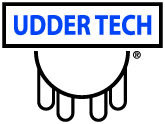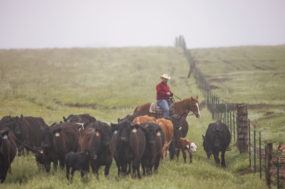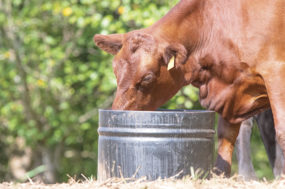If you walked across my pastures, you wouldn’t believe there is a fertilizer shortage. Heck, even the smallest cattle yards have a devil of a time getting rid of all the manure our blessed beasts produce.
But, tossing manure aside (which is another column), we are in a worldwide fertilizer shortage, which is dramatically driving up the price. How could this be? Potash and urea, ingredients in fertilizer, are basically waste products themselves – how could waste become so expensive? Answer: Russia
Yeah, we apparently have the communists to blame, as the bulk of the world’s potash comes from Russia. And, since our relationship with Russia is not going to get better any time soon and will most likely get worse, we producers need to start thinking about alternatives. I attended a seminar recently on this very topic and was informed that the most cost-efficient alternative to fertilizer use is bio-fertilizing and nitrogen-fixing cover crops, like clover, legumes, etcetera. And the best time to plant these cover crops is ... last fall. I’m sorry, but I only half-listened after that.
So, I got to thinking, what emergency measures can we implement now, today? And here, with my limited knowledge, is what I came up with:
- Some estimates state that up to 50% of applied fertilizer is lost due to runoff. As such, better application practices are in order, perhaps multiple applications of smaller amounts of fertilizer over time so that it stays in the soil – yes, the trade-off is higher fuel costs and being more time intensive.
- Focus a lesser amount of fertilizer on certain select parcels of pasture for them to grow well, and leave the other areas to fend for themselves, or use yet another alternative on these areas.
- Dilute the fertilizer – but not too much, or it is all wasted.
- Join with neighbors and try to negotiate quantity discounts with suppliers.
- Hire some local kids to collect the “pasture patties,” grind them and make your own slurry to spread out over the crops.
- Just do without fertilizer this year and hope that past applications over the years have left some residual nitrogen and other nutrients in the soil sufficient to grow something.
Are these great ideas? Not particularly, but they are more useful than “you should have planted last fall.” These are strange times that require us to entertain every possibility and to remain flexible and creative. If you have come up with some other ideas, please share them.
Quick fake meat update
The London School of Hygiene & Tropical Medicine has come out stating that meat production, especially processed meats, are bad for human health and the planet. Putting aside the questionable credibility issue of what a school in London, England, that specializes in “tropical medicine” and “hygiene” knows about the production of meat or its effects, they conveniently skip over, as do most of the anti-meat community, the fact that all their beloved fake meats are so highly processed as to render them nutritiously worthless.
The whole fake meat production process combined with manufacturers’ fear mongering, strangely reminds me of the 1973 movie Soylent Green starring Charlton Heston, wherein the starving population consumes state-processed wafers that consist of nobody knows, but they are told they are soy based. And, if you are not familiar with the movie, you might want to look it up, especially the ending – edamame anyone? Further, these same meat-hating groups also conveniently continue to skirt over the issue of the high climate costs associated with growing all these water-intensive plants and vegetables to then scientifically and chemically transform them into what they think passes for meat. And then they want to force the rest of us to accept these concoctions as a meat substitute because it serves their personal, and often, financial interests. Do we need to address our industry’s climate and environmental issues? Absolutely. But thank God I live in America, where I don’t have to listen to new-age types who think tofu, rice cakes and hummus make an acceptable meal, or a reasonable substitute for a quality steak!
As always, my advice is to grow your herd and keep them (and yourself) healthy, for land’s sake! ![]()
The opinions expressed are those of the author and not of Progressive Cattle.
Jim Walker is a farmer, rancher and all-around thorn-in-the-side with Land's Feed Warehouse in Grand Saline, Texas, who opines on current events affecting the cattle industry. Email Jim Walker.







